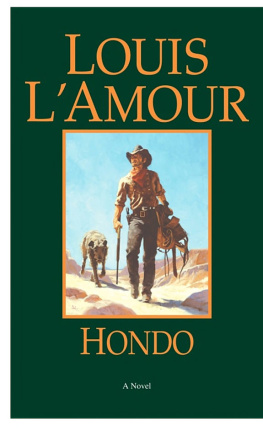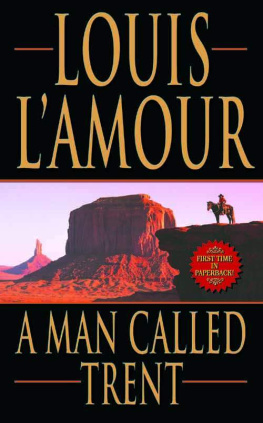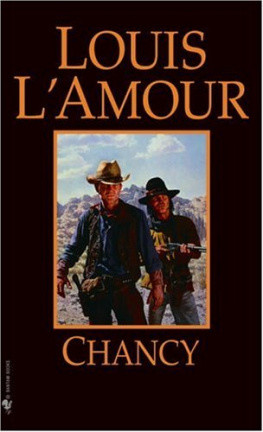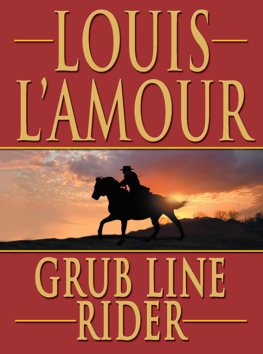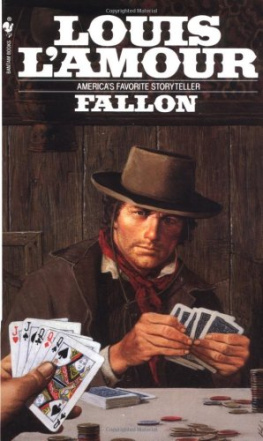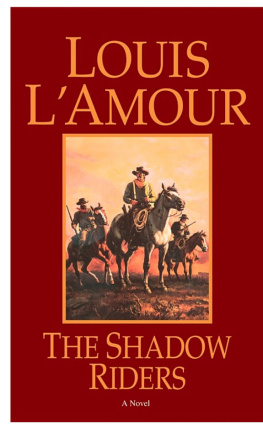Louis LAmour - Dark Canyon
Here you can read online Louis LAmour - Dark Canyon full text of the book (entire story) in english for free. Download pdf and epub, get meaning, cover and reviews about this ebook. year: 2005, publisher: Bantam, genre: Detective and thriller. Description of the work, (preface) as well as reviews are available. Best literature library LitArk.com created for fans of good reading and offers a wide selection of genres:
Romance novel
Science fiction
Adventure
Detective
Science
History
Home and family
Prose
Art
Politics
Computer
Non-fiction
Religion
Business
Children
Humor
Choose a favorite category and find really read worthwhile books. Enjoy immersion in the world of imagination, feel the emotions of the characters or learn something new for yourself, make an fascinating discovery.

- Book:Dark Canyon
- Author:
- Publisher:Bantam
- Genre:
- Year:2005
- Rating:5 / 5
- Favourites:Add to favourites
- Your mark:
- 100
- 1
- 2
- 3
- 4
- 5
Dark Canyon: summary, description and annotation
We offer to read an annotation, description, summary or preface (depends on what the author of the book "Dark Canyon" wrote himself). If you haven't found the necessary information about the book — write in the comments, we will try to find it.
Dark Canyon — read online for free the complete book (whole text) full work
Below is the text of the book, divided by pages. System saving the place of the last page read, allows you to conveniently read the book "Dark Canyon" online for free, without having to search again every time where you left off. Put a bookmark, and you can go to the page where you finished reading at any time.
Font size:
Interval:
Bookmark:
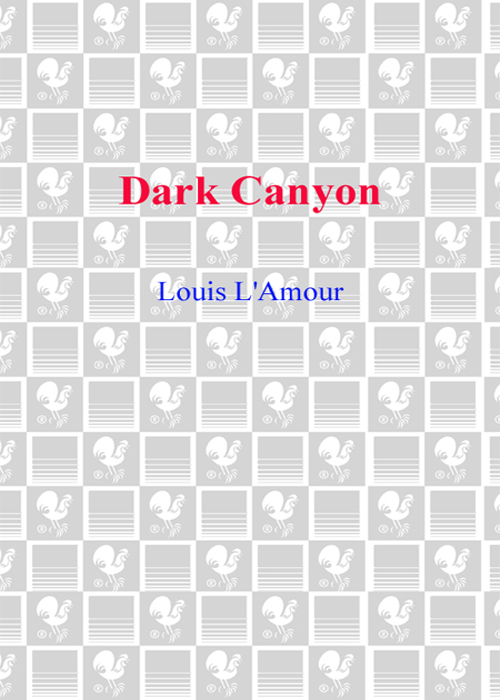
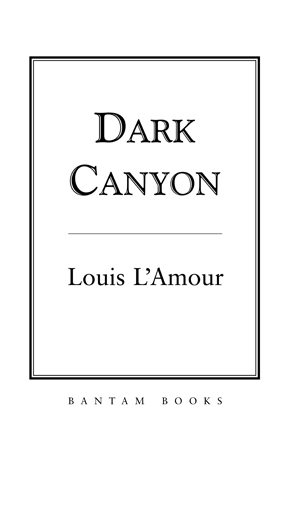
Contents
To Catherine...
CHAPTER 1
W HEN JIM COLBURNrode into the hide-out at sundown he was not alone. There was a gangling youngster riding with him, a kid with narrow hips and wide, meatless shoulders and chest. The old Navy .44 looked too big for him, despite his height.
Jim Colburn stepped down from the saddle and looked around at Kehoe, Weaver, and Parrish. He was a tough man with no nonsense about him, and he was their acknowledged leader.
This here is Gaylord Riley, he said. He's riding with us.
Parrish was stirring beans, and he merely glanced up and offered no comment. Weaver started to object, but at the expression in Colburn's eyes he decided against it; but he was angry. From the beginning there had just been the four of them, no outsiders invited. What they had to do they did with four men, or they left it alone. Kehoe dropped his cigarette and toed it into the sand. Hoddy, boy, he said.
They ate in silence, but when they had finished eating the kid moved over and helped Parrish clean up. Nobody said anything until Colburn had one boot off and was rubbing his foot, then it was he who spoke.
I got myself in a corner. He pulled me out of it.
At daybreak they moved out, taking the trail warily at first. Four hard-bitten, veteran outlaws and a lean, rawboned kid on a crow-bait buckskin. Kehoe was lank and lazy-seeming, Parrish stocky and silent, while Weaver was a brusque man, and this morning an angry one. Jim Colburn, their leader in all things, was a good man with a gun. So were they all.
Weaver's irritation at the stranger's presence was obvious, but nothing was said until they paused at the stream on the outskirts of town.
We'll handle it the same as always, Colburn said. Parrish with the horses, Weaver and Kehoe with me.
Weaver did not even turn his head. What does he do?
He'll ride to that big cottonwood and dismount. He will stand right there until we come by, and if there's shooting, he'll cover us.
That'll take nerve.
Gaylord Riley looked at Weaver. That's what I got, he said.
Weaver ignored him. You ain't never been wrong yet, Jim, he said, and they rode on into town.
Riley dismounted and was busy with his cinch, standing behind his horse with a clear view of the street. The bank was two hundred yards off, and the street was empty and the hour early.
When Colburn, Weaver, and Kehoe came out of the bank and stepped into their saddles the street was still empty.
They had covered almost half the distance to the spot where Gaylord Riley waited, when the banker ran from the bank shouting. He carried a rifle, and he swung it up to fire.
Gaylord Riley had his choice and took it. He aimed at the hitch-rail in front of the banker. Splinters flew at his shot, and the banker leaped wildly for the shelter of the doorway.
The gang rode by the kid and he sprang to the saddle and rode off after them just as people rushed into the street.
In the arguments in the town afterward, some said there were three outlaws, some four. Nobody appeared to have noticed the man farther up the street. Had they observed him, they might have suspected him of trying to run down the outlaws.
They rode hard for the first mile, trying for as much distance as possible. Then the kid saw a dozen steers feeding in the grass close by the trail and, cutting out, he drove them in behind the four outlaws, blotting out their tracks.
Something over a mile farther on they came upon a stream and abandoned the cattle, riding upstream in the ankle-deep water. They were able to follow the stream for half a mile and then they left it and turned into the hills. The pursuit never found their trail, never even came close.
Their take was small, and Weaver showed his irritation when an equal share was counted out for Riley.
Kehoe dropped his share into a pocket. You could have killed that banker, he commented.
There was no need.
The four had been together a long time. They had hunted buffalo together on the Staked Plains of west Texas, and together they had punched cows for Shanghai Pierce, Gabe Slaughter, and Goodnight. Their first step over the line that divides the law-abiding from the lawless was over a matter of wages due them.
Tobe Weston had a handy way with a pen, and a couple of times he saved himself a few dollars by outfiguring his hands, who were notoriously casual about money. The few dollars whetted his appetite until he managed to short every hand who worked for him except Deuces Conron, his strong right arm.
Here and there some cowhand who paid more attention to figures than others would object. When they could not be outtalked they could always be outgunned, and Weston's greed grew with success.
When Colburn, Kehoe, Weaver, and Parrish came to work for him they had heard none of the stories, and it was four months before they did. They decided at once to quit.
Tobe Weston shorted them two months each, and when they objected Deuces was there to back him up. Kehoe was prepared to argue, as were the others, but not to accept the challenge of the four shotguns peering over window sills at themshotguns in the hands of Weston's family.
Forget it, Colburn advised, and they rode away.
They hid out in the mountains and waited for three weeks, and when Tobe Weston rode to town in his black suit they knew their time had come. He was on his way back when they came down out of the rocks and met him and collected their due. Only at the last minute they decided it would serve Weston right if they took all he had. And they did.
That had been the beginning. And that had been a good many years ago.
Their strength lay in careful planning, and in their closeness to each other. They did not talk, and they did not separate; and they would have no strangers in their group until Colburn came back with Gaylord Riley.
The Black Canyon stage holdup was typical of their work, and it took place only three weeks after the kid joined them.
That stage had been held up so many times the drivers were accustomed to it and knew all the likely places. Only Jim Colburn did it in another way. He held up the stage out on the open flat, in the area with the least cover, and where a holdup was unlikely.
The driver saw the buckboard coming along the trail, and it was in plain sight for over a mile, coming along at a trot, trailing a little dust. When it drew near the driver saw that a lean, gangling kid in a farmer's straw hat was driving, with an old man huddled in a blanket beside him on the seat. The kid had one arm around the old man as if to steady him on the seat.
As the stage drew near, slowing to pass the buckboard, the old man raised a feeble hand to signal them to stop.
They did stop, and the tall boy helped the old man down from the buckboard. One of the passengers got down to help, and from under the blanket the old man produced a six-shooter.
From the back of the buckboard, two more men rolled out from under a canvas tarp, and the Black Canyon stage had been held up once again. Afterward at least two of the people on the stage were sure the boy had himself been a prisoner. He certainly, with that buckboard and hat, could be no outlaw. And he had seemed to be frightened. Or so they thought.
R ILEY HELPED AROUNDcamp, and talked little, but his presence continued to irritate Weaver. Loafing on the street at Bradshaw, studying the bank there, Weaver said suddenly to Kehoe, I've had about enough of that kid. What did Jim ever bring him along for?
Next pageFont size:
Interval:
Bookmark:
Similar books «Dark Canyon»
Look at similar books to Dark Canyon. We have selected literature similar in name and meaning in the hope of providing readers with more options to find new, interesting, not yet read works.
Discussion, reviews of the book Dark Canyon and just readers' own opinions. Leave your comments, write what you think about the work, its meaning or the main characters. Specify what exactly you liked and what you didn't like, and why you think so.

